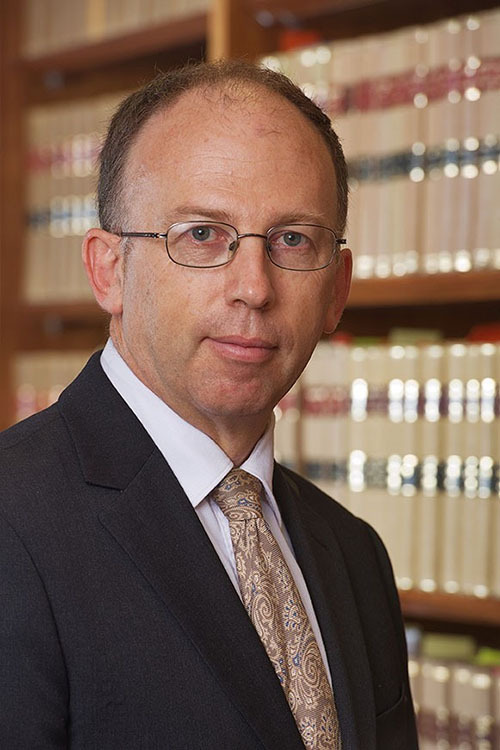- Winter 2024
- The Outsider: Swearing in of his Honour Justice Robert Beech-Jones to the High Court of Australia
The Outsider: Swearing in of his Honour Justice Robert Beech-Jones to the High Court of Australia

The Honourable Justice Robert Thomas Beech-Jones, born in Savage River, Tasmania in 1964, was sworn in as a Justice of the High Court of Australia on the afternoon of 6 November 2023.
His was the headline act, preceded only by a brief supporting performance.[1] Like a Taylor Swift music video, the ceremony had at least one Easter egg: among the new judge’s many friends, we found ourselves in the presence of the not-yet-announced Governor-General-to-be, Sam Mostyn. Again, like Tay-Tay, RBJ knows how to pull a crowd. Ms Mostyn took her place among a small army of Australian National University (‘ANU’) graduates who arrived in droves to fill out Court No 1 and the overflow court – and, eventually, most of the foyer. The enthusiasm of so many old friends spoke volumes for their continuing pivotal role in his Honour’s life. They delighted in the slick production team’s capacity to hang the new judge’s official portrait outside Court No 1,[2] while we were all distracted by tales of his Honour’s early struggles inside. After the ceremony, they gleefully ‘corrected’ the near-parodic triumph-over-adversity tale the speech-givers had spun inside Court No 1.
As we all now know, once he put (not so) Savage River behind him, Justice Beech-Jones’ many attempts to maintain his outsider status were doomed to failure. He was immediately drawn to the nation’s capital, studying science and law at ANU. The science choice was between artificial intelligence and computer coding. RBJ’s decision to study the former may have seemed quixotic at the time, but it was typical of a foresight that went unappreciated until very recently. In another act of prescience, Justice Beech-Jones took prizes in Constitutional Law and Evidence – a valuable combination for would-be High Court judges, if anyone else had been paying attention.
After a short stint mainly in labour law at Freehills, followed by a similarly short stint practising criminal and migration law at Craddock Murray Neumann, Justice Beech-Jones joined the 11th Floor (St James Hall chapter). His Honour took silk in 2006 (don’t mention the war) along with his future boss, now Bell CJ.
Justice Beech-Jones’s practice at the New South Wales Bar led him through every legal jurisdiction for any and all parties. A junior member of today’s Bar could but hope for the breadth and depth of practice that took his Honour from challenging the constitutional validity of gambling regulations in a Local Court prosecution to arguing the minutiae of the various iterations of the Migration Act 1958 (Cth) throughout the 1990s and 2000s before the High Court.
His Honour’s appointment to the Common Law Division of the Supreme Court of New South Wales in 2012 was a surprise to some, given his constitutional law predilections and his participation in many notable inquiries and cases involving directors and corporations. Chapter III jurisdiction seemed his natural home. But the true natural home for the polymath barrister is indeed the Common Law Division – where the criminal law, state administrative law and all aspects of the common law converge.
And then, there was that foresight thing again. Looking back now, the inference is irresistible: that his Honour chose the Common Law Division so he could fine-tune his judicial approach to criminal law, sentencing and evidence, leaving him perfectly positioned to address the selection criteria that would emerge in 2023 for this most recent High Court appointment.
Early on in his career on the Supreme Court, Justice Beech-Jones joined the illustrious group of trial judges, co-ordinated by one of his early mentors and original 11th Floor (St James Hall chapter) members, Hammerschlag (now CJ in Eq), who have drunk the vinegar of reversal in the Court of Appeal, only to taste the ambrosia of vindication in the High Court. (Apparently, there is associated headwear for members; although it is unclear if the club continues to accept new members given Hammerschlag CJ in Eq is now a judge of appeal.)
The first of those cases was Fuller-Lyons v New South Wales [2015] HCA 31. Just 12 months into his appointment, Beech-Jones J, after a seven-day trial, had found an eight-year-old child had fallen from a train as a result of the negligence of the rail operator. His judgment was overturned by the Court of Appeal because other possible explanations for the accident were not excluded. The High Court rejected that approach and re-instated Beech-Jones J’s finding and allowed the appeal. Later, in 2019, the High Court adopted his dissent in the Court of Criminal Appeal in McKell v The Queen (2019) 264 CLR 307 (‘McKell’), quashing a conviction for a trial judge’s comments on disputed facts. The High Court observed that ‘[b]y contrast Beech-Jones J … appreciated the cumulative rhetorical effect of the trial judge's remarks’. The High Court took the opportunity in McKell to strongly discourage trial judges from commenting on disputed questions of fact to avoid the risk of unfairness to either side involved in a criminal trial.
So far, as a justice of the High Court, his Honour has decided an array of cases including migration, land tax and the intricacies of Commonwealth sentencing law. He is, however, taking his role as the resident common lawyer very seriously, reminding all who would listen in the course of argument in an Australian Consumer Law unconscionability case: ‘because if, heaven forbid, this was to be tried before a jury, the jury would decide whether or not it was contrary to the standards’.
*****
In both of his swearings in, Justice Beech-Jones spoke of his parents, his siblings, his children and his partner, Suzie – all of whom he acknowledged for the fundamental role they have played in his life, in particular in supporting his public career. His Honour spoke, in his 2012 swearing in, of his maternal grandfather, who 98 years before had set off for his first day at work, in north Wales, to the coal pit, at the age of 12; his Honour spoke of the opportunities fought for by his grandfather and others like him in Australia and overseas that could result nearly a century later in his own appointment to judicial office.
It is this support and these opportunities that mean that it is time for his Honour to abandon the charade of ‘the outsider’.

Author’s note
The editors sought a more ‘personal’ piece for Justice Beech-Jones’ appointment. This effort may lead them to revert to previous practices [It did not – Eds]. Meanwhile, his Honour suggested this subtitle: ‘through a combination of bloody mindedness, sheer arse and bullshit he finds himself on the high court’ (punctuation as in original).
ENDNOTES
[1] Chief Justice Stephen Gageler AC was sworn in earlier in the day. Justice Beech-Jones’s swearing in was not the subject of any delay or potential constitutional hiccups, unlike that of the Chief Justice: see B Lim & S Palaniappan, ‘Swearing in of his Honour Justice Stephen John Gageler AC’ [2024] (Autumn) Bar News, 30.
[2] The photo of Justice Beech-Jones that travels with this piece is his 2012 portrait from the Supreme Court of New South Wales.
